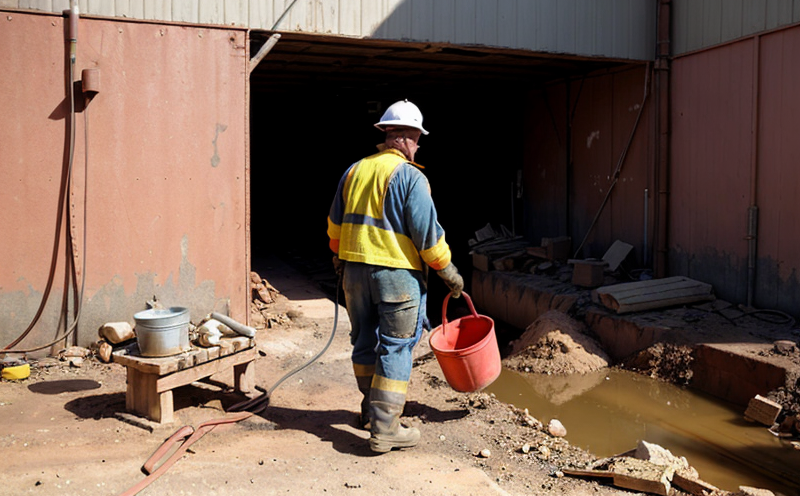MSHA Diesel Particulate Matter Exposure Testing Validation Method Development Test
The Mine Safety and Health Administration (MSHA) sets stringent standards to ensure a safe work environment for miners. One critical aspect of maintaining this safety is monitoring diesel particulate matter (DPM) exposure, which can pose significant health risks when inhaled. Our MSHA Diesel Particulate Matter Exposure Testing Validation Method Development Test is designed to meet these stringent requirements and help mining companies validate their exposure control measures.
This service focuses on the development of validated methods to assess DPM levels in mining environments. By working closely with our clients, we tailor testing protocols to specific mine conditions and operational parameters. The ultimate goal is to provide accurate and reliable data that can inform decision-making processes aimed at improving worker safety.
Our approach begins with a comprehensive understanding of the unique challenges faced by miners regarding DPM exposure. This includes factors such as the type of equipment used, ventilation systems, and work practices. We leverage our expertise in occupational health testing to design tests that are both effective and compliant with MSHA regulations.
The first step in this process involves selecting appropriate sampling techniques and instrumentation suitable for the mining environment. Commonly used devices include gravimetric filters, thermal desorption tubes, or optical particle counters, depending on the specific requirements of the mine. Once samples are collected, they undergo rigorous analysis using advanced analytical methods such as Fourier Transform Infrared Spectroscopy (FTIR) or Gas Chromatography-Mass Spectrometry (GC-MS).
After sample preparation and analysis, our team works with clients to interpret results in the context of MSHA guidelines. This involves comparing findings against established limits for DPM exposure as outlined in relevant standards like MSHA’s 30 CFR Part 69.21. We also provide recommendations on potential improvements to existing control strategies based on these analyses.
Validation of any new or modified testing method is crucial for ensuring its accuracy and reliability over time. Our service includes conducting validation studies that demonstrate the precision, accuracy, linearity, repeatability, and reproducibility of the proposed method. These studies are conducted in accordance with internationally recognized standards such as ISO 17025 for calibration laboratories.
The success of this testing lies not only in achieving compliance but also in providing actionable insights that can enhance overall mine safety programs. By partnering with us, mining companies gain access to cutting-edge technology and experienced professionals who understand both the technical aspects of DPM exposure assessment as well as its broader implications for worker health and wellbeing.
For quality managers and R&D engineers responsible for developing new technologies or refining existing ones within this field, our service offers invaluable support. It allows them to ensure their innovations meet regulatory standards while simultaneously contributing positively towards better occupational safety outcomes in the mining industry.
In summary, our MSHA Diesel Particulate Matter Exposure Testing Validation Method Development Test provides a robust framework for validating DPM exposure control measures in mining operations. Through collaboration with clients, we deliver tailored solutions that address unique challenges posed by different types of mines and working conditions. Our commitment to excellence ensures accurate results aligned with strict regulatory requirements.
Benefits
- Compliance Assurance: Ensures that all testing methods comply fully with MSHA regulations, thereby avoiding potential fines and penalties.
- Risk Reduction: Identifies risks associated with DPM exposure early on, allowing for proactive mitigation strategies to be implemented.
- Informed Decision Making: Provides detailed insights into actual levels of DPM present in the workplace environment, guiding improvements to existing controls or introducing new ones where necessary.
- Precision & Accuracy: Utilizes state-of-the-art analytical techniques ensuring precise measurements and accurate reporting.
Eurolab Advantages
At Eurolab, we pride ourselves on offering unparalleled expertise in environmental health testing services. Our team comprises highly skilled professionals with extensive experience across various industries including mining. We bring this wealth of knowledge to bear when working with our clients to develop validated methods for assessing DPM exposure.
We invest heavily in maintaining state-of-the-art facilities equipped with the latest technologies required for accurate analysis. This commitment ensures that we can deliver consistently high-quality services that exceed expectations.
Our approach is characterized by transparency, reliability, and a strong focus on customer satisfaction. We understand that each project has its own set of challenges; therefore, we tailor our solutions to suit individual needs rather than applying one-size-fits-all approaches.
In addition to technical excellence, Eurolab also emphasizes continuous improvement through regular training programs for staff members and participation in industry forums. This ensures that our team remains at the forefront of developments within this field.





